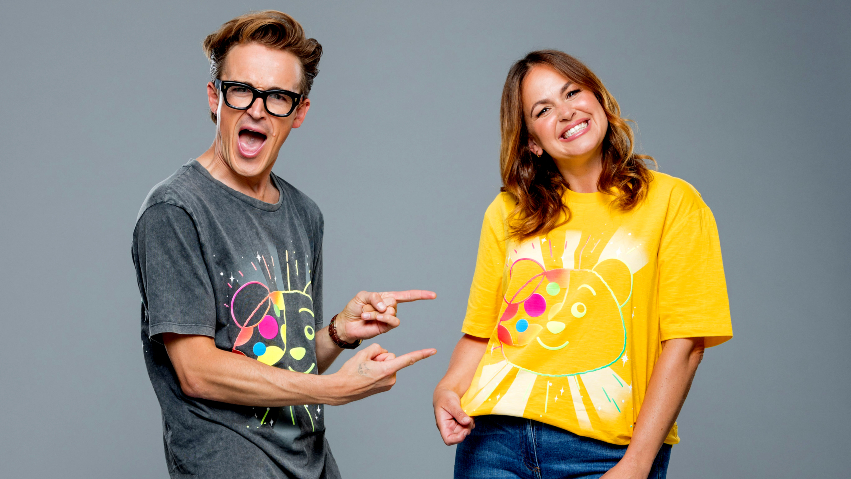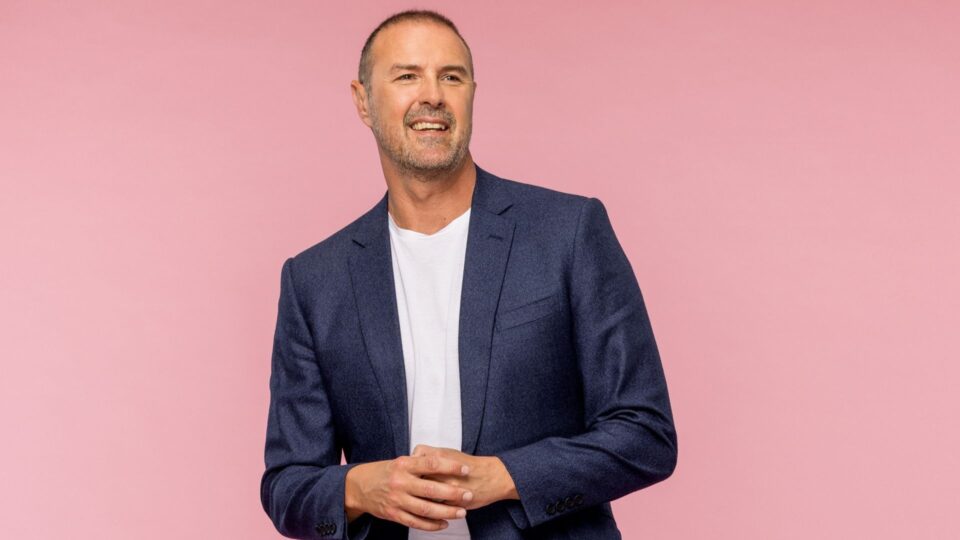Pause, Spot, Share – Pudsey has launched a new tool to encourage children to talk about their feelings and worries

BBC Children in Need has developed a quick and easy three part tool, with the help of clinical psychologist Dr Julie Smith – Pudsey’s Pause – to help parents start daily conversations with the children in their lives, and encourage them to be all ears to help boost children’s emotional wellbeing.
Every three minutes a child is referred to mental health services for anxiety in England, with 1 in 5 children now facing a mental health issue.[1] We know that parent’s can find it difficult to know where to start when beginning to approach their child’s mental health. Our research shows that 58% of parents and carers would like additional support and resources to support conversations around emotional wellbeing with their children.[2]
The three part tool encourages adults to help children to:
- take a pause;
- spot – notice what they are feeling;
- and share their feelings and worries with an adult they trust to help protect their mental health.
Dr Julie Smith said: “It is clearly so important for young people to develop an understanding of their feelings and how to process them. We know that the key to this is for every young person to have role models in their life who can demonstrate how to regulate and handle their emotions in a healthy way. Taking a little bit of time regularly to talk to your child about their emotions can be crucial in spotting small things that may be going on to prevent bigger issues from developing down the line.”
To bring Pudsey’s Pause to life, Pudsey has assembled Pudsey’s Parent Club, a mental health roundtable video series, made up of: Giovanna Fletcher, JB Gill and Katie Piper. Hosted by Dr Julie Smith, the series of conversations explores what it’s like to approach mental health personally and as a parent and how the new tool can be applied to everyday life.
During the conversation, Giovanna Fletcher opened up about her experiences with bullying growing up as well as how she creates moments in her every day for her family to open up to each other, such as having candlelit dinners with her family.
Speaking on how she has learnt from her own experiences with mental health never to be dismissive of any kind of emotion, Katie Piper said: “It’s not about demonising some emotions and allowing others. If my children are feeling angry or frustrated, I want it to be a safe space where they can feel those things. I have learnt with my own mental health, that you must accept those emotions and let them happen in order to process them and release them from the body.”
Pudsey’s Pause comes following last year’s launch of The Heaviest Backpack, a film which highlighted that the issues facing children and young people across the UK are growing. Through the charity’s own insights we’ve learnt how strong, supportive relationships with the people who care for children are crucial in supporting their mental health and can be the key ingredient in preventing them from reaching the point where specialist intervention is needed.
Pudsey has also teamed up with BBC Moodboosters for a special Live Lesson packed with techniques to help children deal with their worries, keep calm and build self-belief. The Live Lesson is available on BBC iPlayer and a teaching guide and activity sheets are available on the Bitesize website.
Simon Antrobus, CEO of BBC Children in Need added: “At BBC Children in Need we know that strong, supportive relationships with the people who care for children are crucial in supporting their mental health. These positive relationships with the important people in children’s lives can really help to ease the burdens they carry, but not all of us are confident about where to start, with 58% of parents in our research saying they’d like more support. So that’s why we’ve created Pudsey’s Pause with Dr Julie, to help adults get started and ensure no child faces their emotional and mental health challenges alone.”
BBC Children in Need is funding more than 500 projects across the UK which supports children and young people with their emotional wellbeing and mental health to the value of £32m. These projects provide positive relationships, creating trusting and safe connections between children and the important people in their lives; which help them to overcome barriers and can prevent more serious mental health issues from emerging.
To find more information on how to support a child in your life, head to bbc.co.uk/Pudsey, and to watch Pudsey’s Parent Club, head to BBC Children in Need’s YouTube Channel.
– ENDS –
Notes to Editors
For images & video content please use the link here:
Extra Quotes:
Commenting on the importance of creating safe spaces and surrounding your children with a collective of role models, Giovanna Fletcher added: “Community is so important, and it goes beyond us at parents. Every adult you bring into your child’s life can have a profound impact on their future. So often you hear about incredible people that have done amazing things, and that person will credit a teacher, they will credit some other positive relationship outside of their family unit that gave them that confidence and sense of belief that they actually can achieve great things. So, I think the community aspect of raising children is absolutely key.”
Touching upon the current conversation around the approach to raising boys versus girls in today’s climate and the importance of regulating your own emotions as a parent, JB Gill said: “Sometimes when you have that moment to pause and stop, it just puts everything into perspective. It is so important to have open conversations with your children. That may sound very obvious, but actually, I feel it’s something that we miss out a lot. We are very focused on both of our children being able to express themselves, especially Ace. We have never restricted him from voicing any of his emotions or the things that he is concerned about, even if it is seen as taboo for boys to express themselves, but I do think that is changing.”
Discussing how to implement the Pudsey Pause in simple everyday moments, Katie Piper said: “We are trying something new and have just got a puppy for the first time. Having an animal in the house has really made us come together as a family unit as we now all share this responsibility of having a pet. Outside the house on those walks, we are really feeling the therapeutic benefits of being able to switch off, put the phones away and really just enjoy each other’s company. Whether that’s a nice silence or conversations that naturally just come up. Those are our pause and stop moments.”
About BBC Children in Need
BBC Children in Need believes that every child should have the chance to thrive and be the best they can be. For this to happen, we want every child to have someone they can turn to for help or support to overcome challenges they face.
We make sure there’s someone able to give food, clothes and beds to a child living without; someone qualified to talk a child who is anxious, isolated or grieving; someone trained to mentor teenagers in communities facing inequality, violence or lack of opportunity; someone to be there for children living with serious illness, disability or carrying a load that’s just too heavy to manage alone.
BBC Children in Need supports children in the communities where you live. We fund amazing people in family centres, community spaces, youth clubs and refuges; homeless shelters, hospices and helplines. In England, Scotland, Wales and Northern Ireland. Only with your support can we continue to be there for hundreds of thousands of children when they need us most. Only with your support can we change their lives.
[1] Source: Guardian NHS referrals for anxiety in children more than double pre-Covid levels August 2024
[2] There are a range of sources including from our own survey and what we hear from our grantees as well as from research and other organisations that recognise that parent/carers of children and young people with mental health issues have a range of support needs including access to information about where to seek help, how to talk to their child and what resources are available.
BBC CiN mental health survey 2023
BMJ Mental Health Systematic review with qualitative meta-synthesis of parents’ experiences and needs in relation to having a child or young person with a mental health difficulty March 2025
BMC Parent-perceived barriers to accessing services for their child’s mental health problems 2021
Young Minds How to talk to your child about mental health


